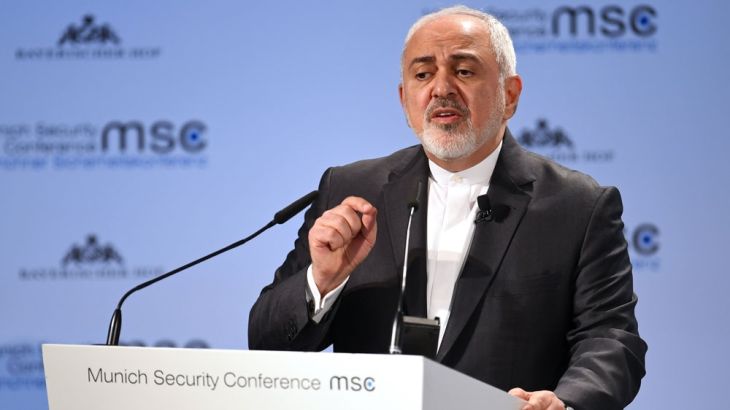Iranian FM Zarif says Israel ‘looking for war’
Zarif addresses Israeli actions in the region, the US ‘obsession’ with Iran and EU efforts to save the nuclear deal.

Iran‘s Foreign Minister Mohammad Javad Zarif has accused Israel of “looking for war” and warned that its behaviour and that of the United States were increasing the chances of a clash in the Middle East.
“The risk [of war] is great. The risk will be even greater if you continue to turn a blind eye to severe violations of international law,” Zarif said in an address at the Munich Security Conference on Sunday.
Zarif appeared to be referring to Israeli air attacks against Iranian targets in Syria.
“Certainly, some people are looking for war … Israel,” he said.
Israel carried out a series of air raids last month against what it said were facilities belonging to the Iranian Revolutionary Guard in Syria.
Israel has carried out hundreds of air attacks in Syria in the past few years against Iranian and Hezbollah targets.
“Israeli behaviour is putting international law on the shelf, US behaviour is putting international law on the shelf,” said Zarif.
‘US obsession’
During the speech, the Iranian foreign minister also addressed the US’s “unhealthy fixation” with his country and condemned the Trump administration’s efforts to press European countries to pull out of the nuclear agreement with Tehran.
On Saturday, US Vice President Mike Pence urged European powers Germany, France and Britain (the E3) to follow Washington in withdrawing from the deal and to “stop undermining US sanctions”.
The nuclear deal was signed in 2015 to curb Iran’s nuclear capacity in exchange for sanctions relief before US President Donald Trump decided to withdraw the US from the deal in May.
Zarif said Pence “arrogantly demanded that Europe must join the US in undermining its own security and breaking its obligations” and also slammed Washington as the “biggest source of destabilisation” in the Middle East.
‘Europe needs to get wet’
Pence’s remarks came days after the EU made a final attempt to keep Iran part of the nuclear deal launching a financial vehicle, INSTEX, a barter-type system to facilitate humanitarian trade between Europe and Iran while skirting direct financial transactions with Iran, evading possible US sanctions.
Referring to the payment mechanism, Iran’s foreign minister said that it will fell short and that the three signatories of the deal – France, Britain and Germany – needed to do more to show their commitment to the 2015 nuclear deal with Iran.
“INSTEX falls short of commitments by the E3 to save the nuclear deal,” Zarif said at the conference.
“Europe needs to be willing to get wet if it wants to swim against the dangerous tide of US unilateralism”.
The three European nations, as well as Russia, China and the European Union as a whole, have been struggling to save the 2015 deal with Iran since Trump announced the US withdrawal last year.
Those working to preserve the agreement have been trying to walk a fine line between mollifying Iran without angering Washington.
Zarif’s comments appeared directed at European assurances that INSTEX could concentrate on products not currently subject to US sanctions, such as medicine, medical supplies, and agricultural goods, rather than on broader trade.
Reporting from Munich, Al Jazeera’s Hashem Ahelbarra said Zarif struck a more assertive tone than he had done previously.
“I have seen Javad Zarif last year here in Munich partly charming, trying to reach out to the world saying that the best chance for the world is to engage diplomatically with Iranians, and partly aggressive when saying that the Israelis are trying to drag the region towards conflicts and wars.
“Today I have seen a different Javad Zarif being very aggressive, hitting back at US Vice President Pence saying that American fixation with Iran is pathologic.”